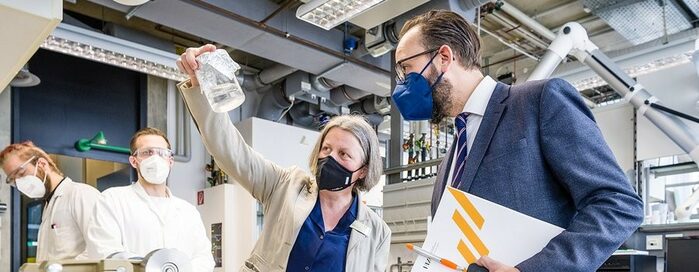|
Landeshauptstadt Dresden - www.dresden.de https://www.dresden.de/en/business/tomorrow-s-home/news/2024/004-htw-laboratory.php 24.06.2024 16:19:45 Uhr 19.04.2025 09:39:12 Uhr |
|
Focus on microplastics: New equipment strengthens cross-faculty research at HTWD

The German Research Foundation (DFG) is funding the Dresden University of Applied Sciences (HTWD) with one million euros. The university is using the money to equip a joint laboratory in which researchers from various faculties are investigating the impact of microplastics on the environment. The new, state-of-the-art equipment promises better analysis and sample results, which should lead to progress in the fields of soil science, hydrology and vegetation technology.
Microplastics are an almost invisible hazard and too little is known about their impact on the environment. The HTWD would like to change this and is attempting to better understand the behavior of particles just a few millimeters in size as part of various research projects. It is now receiving support from the DFG, which is funding the joint laboratory for "Environmental behavior of polymers in soil-water-vegetation compartments" with one million euros. The money was used to purchase new laboratory equipment that will enable better sample and analysis results. The aim is to obtain more and more precise data on water, soil and air pollution - and faster than before.
In the newly equipped joint laboratory, researchers from various faculties are pursuing the goal of advancing microplastics research in the fields of soil science, hydrology and vegetation technology. The Faculties of Agriculture, Environment and Chemistry and the Faculty of Civil Engineering are in charge of the project. For them, the new laboratory equipment creates an excellent research infrastructure from which future scientists will also benefit. For example, the SEMUWA junior research group is investigating the various methods of bank filtration that can be used to produce microplastic-free drinking water. Here, too, a cross-faculty approach is being pursued, bringing together the expertise of researchers from electrical engineering and mechanical engineering.
"The targeted investment in state-of-the-art equipment is not only an enrichment for our cross-faculty collaboration, but also a springboard for innovative technologies and findings as a basis for further effective contributions by HTW Dresden to sustainable development," says Professor Kathrin Harre, Head of the Microplastics Research Group at HTWD. HTWD Rector Professor Katrin Salchert emphasizes: "For our university and especially for the researchers, the acquisition of DFG funding is a very great success and a confirmation of the work done so far by all those involved. This shows that our aim of promoting application-oriented research in the interests of environmental protection and resource conservation also stands a good chance with such demanding funding projects."






